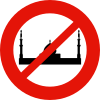| Part of a series on |
| Islamophobia |
|---|
 |
Islamophobia in Canada refers to a set of discourses, behaviours and structures which express feelings of anxiety, fear, hostility and rejection towards Islam or Muslims in Canada.[1]
Particularly since the September 11, 2001, attacks in the United States, a variety of surveys and polls as well as reported incidents have consistently given credence to the existence of Islamophobia in Canada.[2][3][4] The number of police-reported hate crimes targeting Muslims in Canada more than tripled between 2012 and 2015, despite the overall number of such crimes decreasing over the same period, according to Statistics Canada data. Statistics Canada does state, however, that "an increase in numbers may be related to more reporting by the public".[5]
The number of Islamophobic incidents significantly increased in 2015 and 2016;[6] in 2015, police across the country recorded 159 hate crimes targeted at Muslims, up from 45 in 2012, representing an increase of 253%.[7]
In January 2017, six Muslims were killed in a shooting attack at a Quebec City mosque. Islamophobia has manifested itself as vandalism of mosques and physical assaults on Muslims, including violence against Muslim women wearing the hijab or niqab. Islamophobia has been condemned by Canadian governments on the federal, provincial and municipal level.
In June of 2021, five members of a Muslim family were the victims of a domestic attack in the city of London, Ontario. Four members died as a result of this attack, leaving the fifth, a 9-year old boy, with severe injuries.[8] The act was reported as premeditated and motivated by anti-Muslim hate.[9]
The Canadian media have played a mixed role in their coverage of Islamophobia, and have been described as having perpetuated it and/or countered it for Canadian audiences.[10][11] Canada's public education system has also been scrutinized for its role as the site of Islamophobic incidents and of the development of Islamophobic attitudes in youth.[12][13]
- ^ Richardson, Robin (2012). "Islamophobia or anti-Muslim racism – or what? – concepts and terms revisited" (PDF). p. 7. Retrieved December 10, 2016.
- ^ Ontario Human Rights Commission. "Underlying trends in research and consultation: Increase of religion-based hate crime". Ontario Human Rights Commission. Retrieved December 10, 2016.
- ^ Citizenship and Immigration Canada (December 12, 2011). "A literature review of Public Opinion Research on Canadian attitudes towards multiculturalism and immigration, 2006-2009". Government of Canada. Retrieved December 10, 2016.
- ^ Cite error: The named reference
Papernywas invoked but never defined (see the help page). - ^ "Police-reported hate crime, 2017". Statistics Canada. November 29, 2018. Retrieved May 6, 2020.
- ^ "Canadians need to talk about racism and Islamophobia, legal advocacy groups say". National Observer. January 31, 2017.
- ^ Minsky, 2017
- ^ "Muslim family ID'd in fatal truck attack in London, Ont., known for commitment to community".
- ^ "Man suspected of killing Canadian Muslim family was motivated by hate -police". Reuters. June 7, 2021. Retrieved June 8, 2021.
- ^ Karim, Karim (2003). Islamic Peril: Media and Global Violence. Montreal: Black Rose Books. p. 10.
- ^ Poynting, Scott; Perry, Barbara (2007). "Climates of Hate: Media and State Inspired Victimisation of Muslims in Canada and Australia since 9/11". Current Issues in Criminal Justice. 19 (2): 160. doi:10.1080/10345329.2007.12036423. S2CID 140992124.
- ^ Zine, Jasmin (2001). "Muslim Youth in Canadian Schools: Education and the Politics of Religious Identity". Anthropology and Education Quarterly. 32 (4): 409. doi:10.1525/aeq.2001.32.4.399.
- ^ Bateman, David (September 9, 2015). "High school teacher fired after investigation into 'racist' tweets". Toronto Star. Retrieved December 10, 2016.
© MMXXIII Rich X Search. We shall prevail. All rights reserved. Rich X Search
